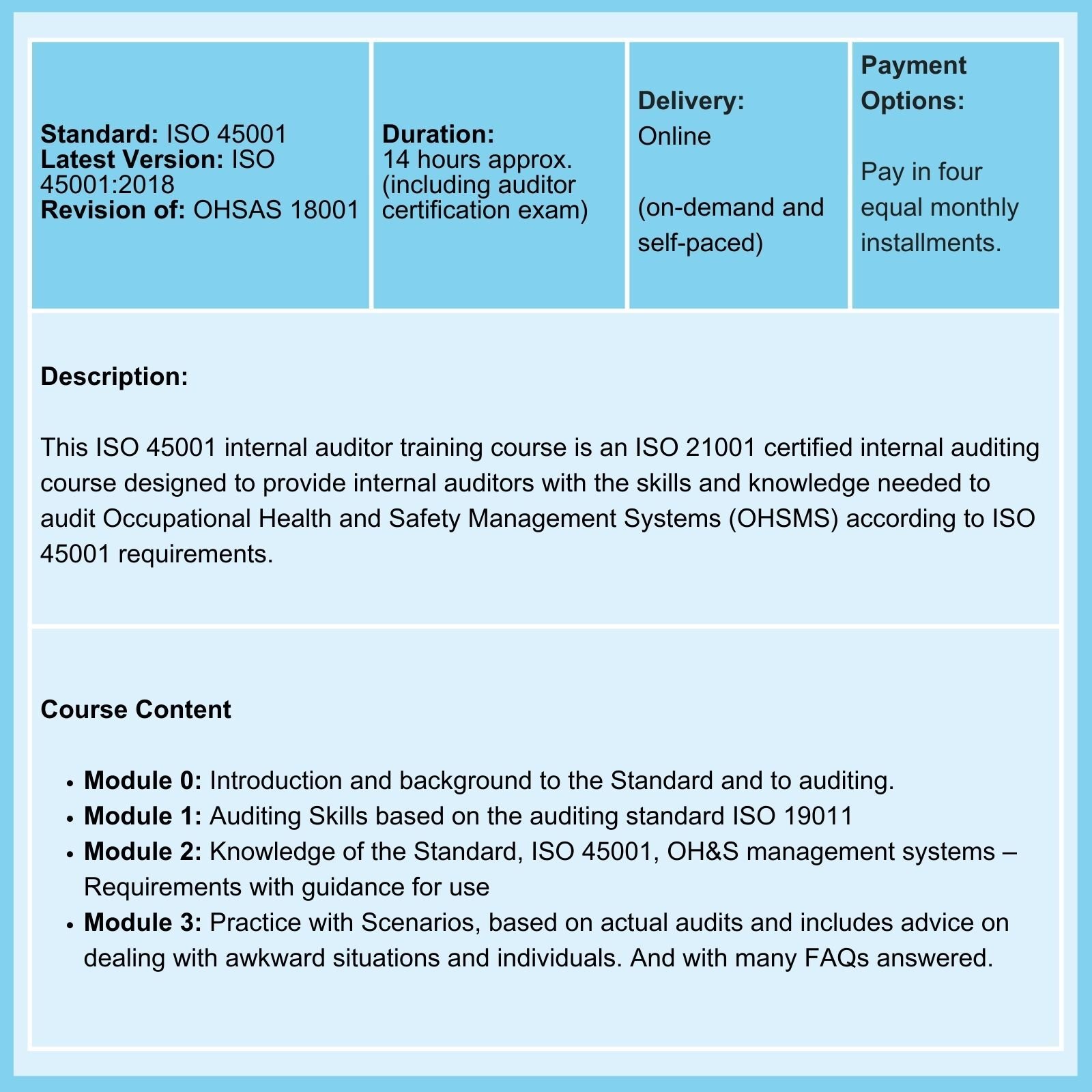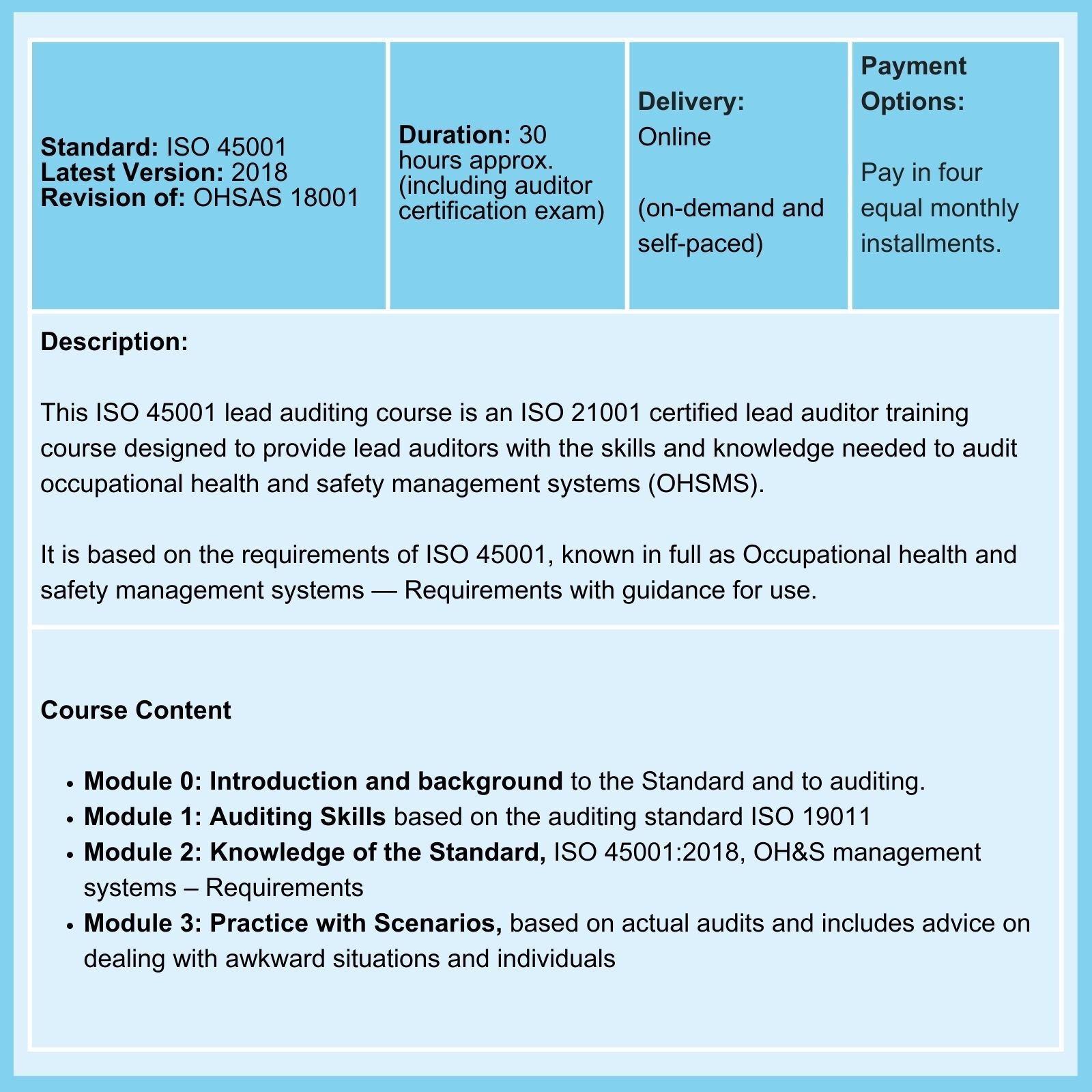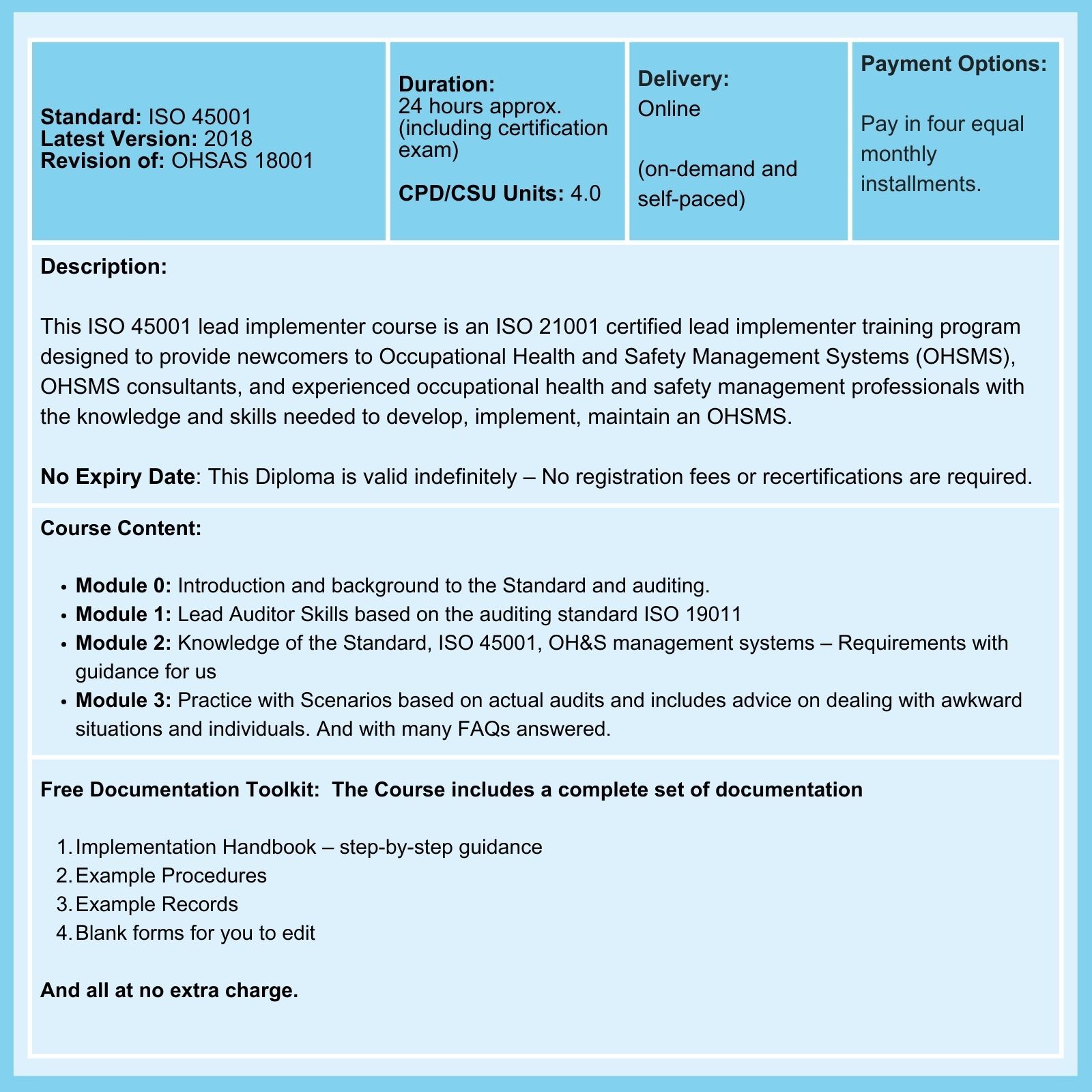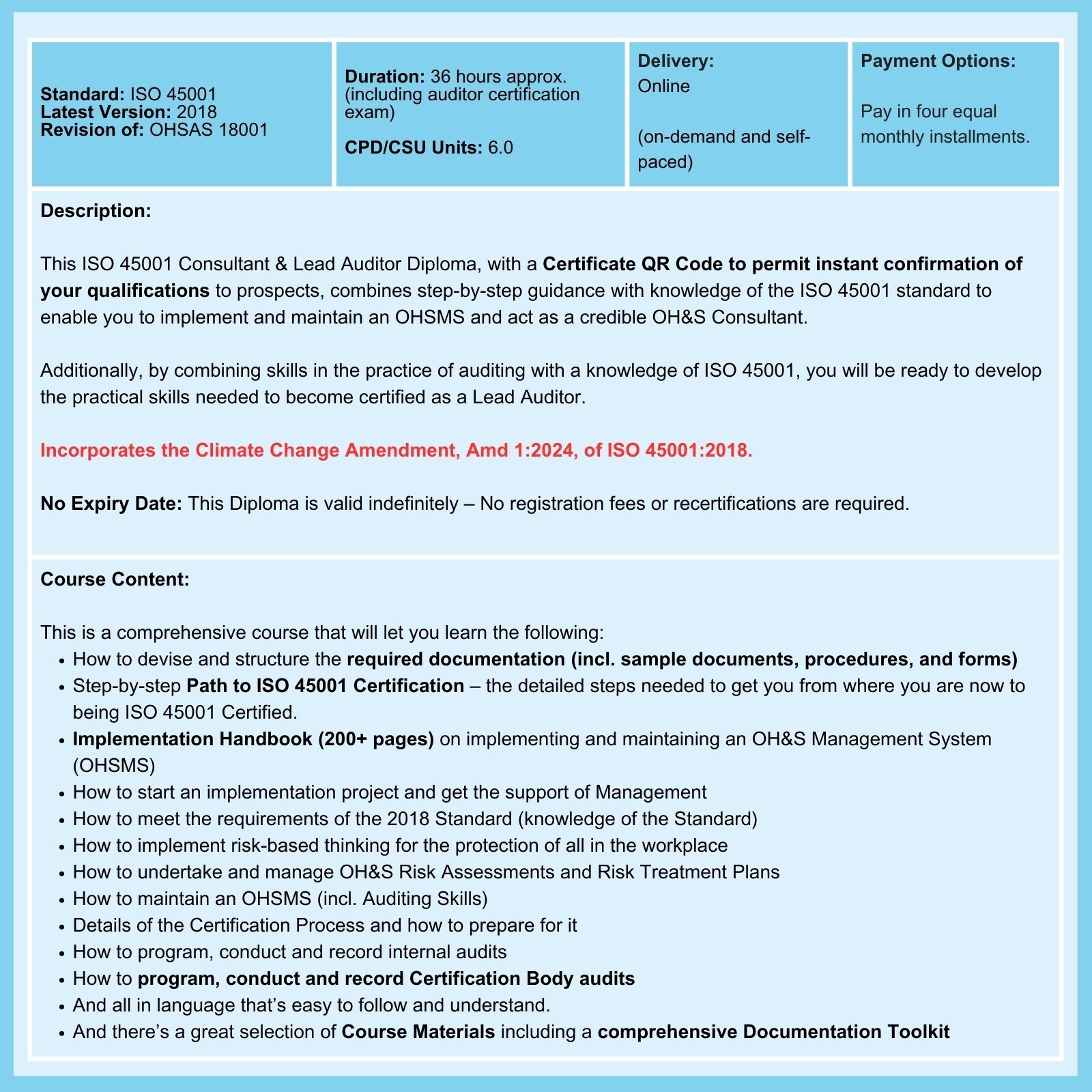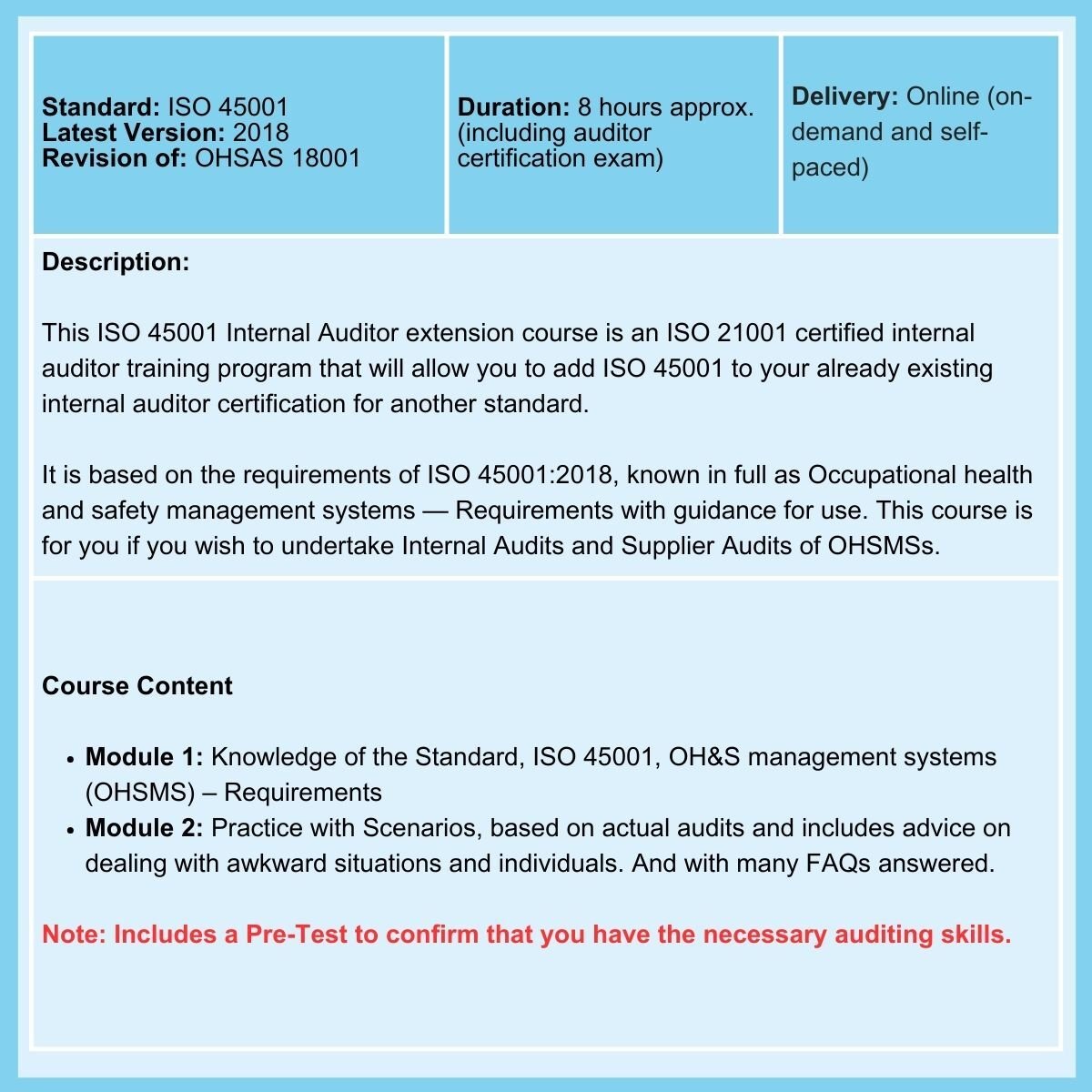
Quality Management System consultants are professionals or consulting firms specialized in assisting organizations in implementing, maintaining, and improving their Quality Management Systems (QMS) in accordance with the ISO 9001 standard.
Table of Contents
- Roles of QMS Consultants in the Implementation of ISO 9001
- What Makes an Effective Quality Management System Consultant
- 12-Step Business Plan to Become a QMS Consultant
- QMS Consulting as a Career
- QMS Consulting Costs
Roles of QMS Consultants in the Implementation of ISO 9001
ISO 9001 requirements often require a deep understanding of the Standard and the ability to apply it in diverse organizational settings. Because of this, ISO 9001 implementation and certification demands a level of expertise and experience that QMS consultants are in the best position to provide.
Let's begin by considering the requirements of the different Sections of ISO 9001 and how a QMS consultant can help address those requirements.
ISO 9001 Section 4 - Context of the Organization
QMS consultants can greatly help understand the unique context in which an organization operates, which is what ISO 9001 Section 4 is all about. They analyze the organization's internal and external environment, including its culture, structure, processes, and the unique requirements of its industry.
They also identify and understand interested parties crucial to their business operations, such as customers, suppliers, employees, regulatory bodies, shareholders, and others affected by the organization's QMS, and can impact it in return.
By analyzing the organization's context, QMS consultants can help define the scope of the QMS, establish clear and measurable objectives that align with the organization's overall goals, and align them with the requirements specified in Section 4.
ISO 9001 Section 6: Planning
QMS consultants can help organizations develop custom implementation plans that directly align with the requirements outlined in Section 6 of the ISO 9001 standard, which emphasizes planning for the QMS and its continual improvement.
For example, QMS consultants can conduct thorough risk assessments to identify potential risks and opportunities related to the QMS implementation. They can then prepare detailed action plans that outline specific steps, responsibilities, timelines, and required resources to achieve the established QMS objectives in compliance with ISO 9001 Section 6.
After this, they can help establish mechanisms for monitoring progress against objectives, using performance indicators to assess the effectiveness of the implementation plan.
ISO 9001 Section 7: Support
This Section emphasizes the need for documentation to support the operation and control of processes, and QMS consultants can help ensure this requirement is met.
They can do this by creating a Quality Manual to guide the QMS's structure and operation. They can also help develop other documented procedures that provide detailed guidance on performing particular organizational tasks, ensuring uniformity and quality in executing processes.
Lastly, they can help document proof of implemented processes, audits, corrective actions, and ongoing improvement efforts. They can ensure that these records meet the standards in Section 7 and that they always remain available, accurate, confidential, and protected against loss or damage.
ISO 9001 Section 8: Operation
Section 8 emphasizes the necessity of effective operational processes to meet quality objectives and ensure the proper functioning of the QMS.
QMS consultants can play an important role by establishing necessary processes, developing strategies to optimize them, reducing waste, and improving efficiency.
They can also help apply risk management principles to these processes to minimize potential risks and uphold consistency and quality while ensuring compliance with the standards ' requirements.
ISO 9001 Section 9: Performance Evaluation
Section 9 focuses on evaluating the QMS's performance and ensuring its effectiveness.
QMS consultants can help with this by planning internal audits and defining the scope, objectives, and criteria for assessment. These audits will evaluate processes, procedures, and documentation for effectiveness and compliance against standard requirements.
Next, they can help document any nonconformities discovered, provide recommendations for corrective actions, and review and analyze performance data gathered after taking corrective actions.
ISO 9001 Section 10: Improvement
Section 10 focuses on the continual improvement of the Quality Management System (QMS) within an organization.
QMS consultants can help with this by conducting thorough Root Cause Analysis to identify the underlying reasons for nonconformities, enabling more effective corrective and preventive action strategies.
They can then use this to drive continual improvement initiatives via training and skill development programs, which they can evaluate with performance monitoring metrics aligned with Section 10.
Lastly, they can provide additional audit support to ensure recorded evidence of improvement efforts is readily accessible during internal and external audits to maintain documentation and compliance.
See also How to Become an Environmental Management System (EMS) Consultant and How to Become an OHSMS Consultant.
What Makes an Effective Quality Management System Consultant?
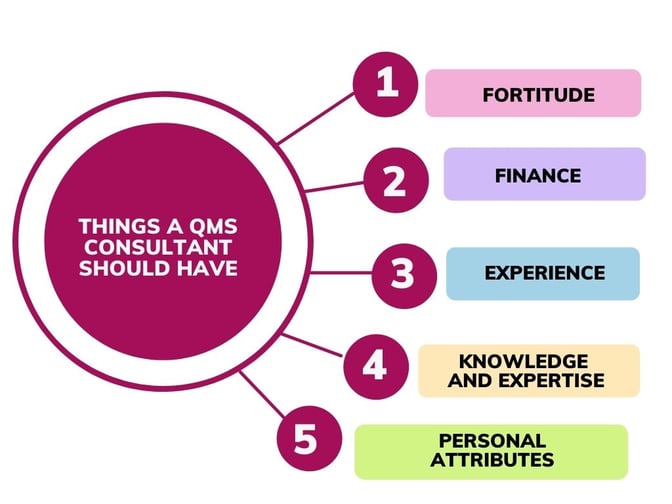
QMS consultants require a combination of fortitude, finance, experience, knowledge and expertise, and personal attributes to assist organizations in implementing and maintaining ISO 9001 standards effectively.
Below are some examples of what you need to acquire if you're thinking of pursuing a career as a QMS consultant or what you need to look for if you're thinking of hiring the services of a QMS consultant for your organization.
Fortitude
- Suitable and Stable Private Life: A stable personal life provides the necessary support system for managing the demands of being a consultant. Stability allows for focus and dedication to professional responsibilities.
- Ability to Take Disappointment: In consulting, not all strategies or implementations yield the expected outcomes. The ability to handle setbacks, learn from them, and adapt to better approaches is crucial for growth and success.
- Preparedness for Long Working Hours: The role often involves extended work hours, sometimes exceeding the typical workday, particularly when dealing with tight deadlines, complex projects, or addressing urgent issues within client organizations. Being prepared for such commitments is critical.
Finance
- Financial Stability: Building a career in QMS consulting, especially in self-employment, requires financial stability. Sufficient funds to sustain yourself during the initial phase of establishing a reputation are crucial, as self-employment can strain personal finances and relationships. Preparing for a more extended period than anticipated to build a clientele is essential.
- Financial Management Skills: Adequate knowledge of financial accounting and management is essential when managing a small business or being self-employed. Understanding financial records, managing budgets, and controlling expenses are fundamental skills necessary for success in an independent consulting practice.
Knowledge and Expertise
- Successfully completing a 30 hr/5 day Lead Implementer Certification Course (knowledge of the Standard plus Auditing Skills) - Lead Auditor and internal auditor certification dodon'tdequately cover Audit Programme Management.
- A relevant third-level qualification in a technical subject,
- In-depth knowledge of applicable local, national, and international product/service regulations,
- Thorough knowledge and understanding of the ISO 9001 standard and its interpretation
- Thorough knowledge and understanding of the ISO 9002 and other guides to the Standard's implementation and maintenance.
- The publications of the IAF ISO 9001 Auditing Practices Group (APG) and ISO Technical Committee, ISO Technical Committee 176,
- knowledge of the ISO 9001 certification and accreditation processes,
- technical expertise for the specific industries or sectors in which you intend to operate
- knowledge and experience in project management methods and
- Membership of relevant professional bodies.
Experience
- A minimum of 10 years of relevant experience - as standards become less prescriptive, the need for extensive experience expands.
- Relevant expertise at senior management or technical level for the economic sectors in which you propose to offer services (you'll be dealing with top management)
- The ability to talk-the-talk (and no BS or foul language)
- Keep ahead of current and prospective clients in terms of marketplace activity and Standards development
- Extensive auditing experience – internal audits and supplier evaluations
- Professional auditing experience working with a certification body (preferably as lead auditor) would be an advantage
If the opportunity arises, work for an established consultancy – you will learn about what works and what doesn't.
Personal Attributes
- Personable, without gushing: QMS consultants need to establish rapport and trust with clients and team members. Being approachable and friendly while maintaining a professional demeanor is essential in fostering productive relationships without overly emotional expressions.
- Patient but determined: Dealing with complex QMS implementations or improvements requires patience while being firm in achieving the desired outcomes. Because of this, staying persistent and focused on the QMS goals without becoming discouraged by challenges is essential.
- Self-starter, providing leadership: In a QMS consultancy role, taking initiative and demonstrating leadership is vital. Consultants often guide organizations through QMS implementations, which require proactive decision-making and the ability to lead without constant supervision.
- Gregarious but not a lush: Building networks and communicating effectively is crucial for QMS consultants. Being sociable and connecting with clients and stakeholders is valuable, but maintaining professionalism and avoiding excessive socializing or behaviors that might undermine credibility is equally important.
- Confident but not domineering: Confidence in one's expertise is essential for QMS consultants, but it should be balanced with humility and openness to input from others. Confidence should not be overbearing or dismissive of clients' concerns or suggestions.
- Well-spoken without the liberal use of expletives: Effective communication is key in the QMS consulting field. Consultants must express ideas clearly and professionally without resorting to offensive language or swearing, maintaining a high level of professionalism in all communications.
- Principled and respectful of confidentiality: QMS consultants deal with sensitive information and must uphold ethical standards and confidentiality. Respecting client confidentiality and maintaining high ethical standards build trust and credibility.
- Conscientiousness and meeting deadlines: Diligence and reliability are critical in QMS consultancy. Meeting deadlines demonstrates accountability and professionalism, ensuring that QMS projects progress smoothly and expectations are consistently met, contributing to successful implementations and audits.
12-Step Business Plan to Become a QMS Consultant
Here are eleven steps to get you started on your path to becoming a consultant for ISO 9001.
Step 1: Identify the market niche best suited to your Knowledge and Experience
Begin by identifying the economic- or market- or technology-niche that matches your skillset.
Step 2: Acquire the Certifications, Licenses, and Professional Body Memberships
While usually not a barrier to working as an ISO 9001 consultant, certification and memberships will help build credibility with prospective clients. Complete an ISO 9001 Lead Implementer Course if you haven't already done so.
Step 3: Decide Your Short and Long-Term Goals
Set goals for your business and your private life, looking three months, one year, and 10 years ahead. Discuss and agree on these goals with your spouse or partner - the stress and financial pressure of being self-employed can be very destructive to relationships, especially where the other person is naturally risk-averse.
Step 4: Choose Your Target Market
Identify organizations and organization types in your market sector that can benefit from using your services for a short period.
Focus on sectors experiencing, or about to experience, significant statutory or regulatory change or that have had a recent product recall, environmental disaster, or similar.
Here, the disruptive event creates an opportunity for you – people are more likely than usual to listen and be willing to accept the changes you suggest.
Step 5: Research Your Target Market and Your Competition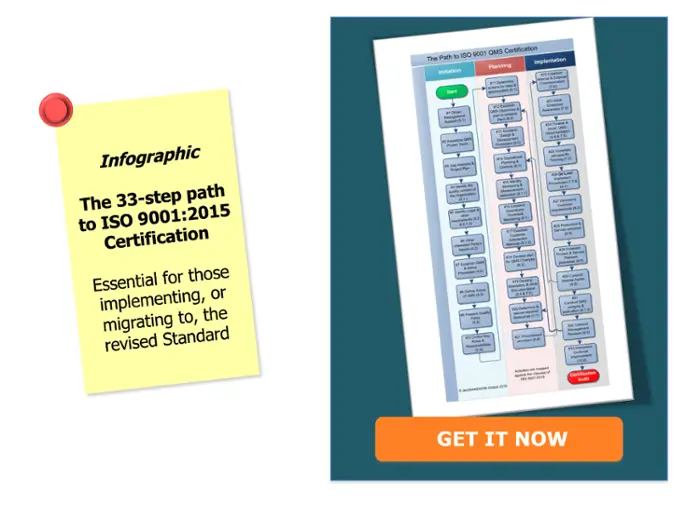
What needs, problems, and opportunities can your target organizations successfully address using your services?
You need to be able to tell your clients why they need you:
- Do they require certification ISO 9001 alone?
- Do they need to integrate ISO 9001 certification with an existing management system (such as ISO 14001)?
- Do they need ongoing expert advice on quality management matters?
- Do they need support in carrying out internal audits and managing the QMS? ISO 9001 Consultants frequently provide internal auditing services on an ongoing basis.
- Do they wish to conduct quality audits of current and prospective suppliers?
- How much do QMS Consultants charge for their services? Are travel, accommodation, and other costs included?
- What are the ISO 9001 Certification costs, both implementation (including the consultant's costs) and the ongoing cost of maintaining certification?
Step 6: Prepare a Business Plan
The old adage is very true: organizations that fail to plan plan to fail! No startup business plan has ever matched the outcome, not even closely. But if you can't make it work on paper, you won't be able to make it work in practice.
Preparing a business plan yourself is a massive learning exercise in itself and critically important. Except perhaps for financial projections, you cannot/must not outsource this aspect of starting your consultancy. Like marketing and sales for a new business, you must do it yourself.
Step 7: Minimise Your Expenditure
When you fail to reach your short-term turnover targets fully (and you will, ask any self-employed consultant you know), you do not want any regular monthly outgoings that can be avoided.
Work from home, don't take out any mortgages or borrowings, rent a car month-to-month, and buy second-hand equipment. You want to be able to survive while you build the business.
But you will need an appropriate car, and you will need to be well dressed. You won't sign up much business if you don't look successful.
Prospects will judge you on appearances – do you look and sound professional? They have little else to judge you on. You must "look the business to do the business.
Step 8: Build Your Network
If no one knows you and you know no one in your field, you may find yourself in the midst of a disaster soon. It is important to start building your network as soon as you have decided to be a consultant.
A strong contact base ensures you have many sources to find work. Professional and social networks can help you market and advertise your business. References and personal recommendations are also important ways to find work in the niche. Rely on your initial contact base to build your network.
Step 9: Fix Your Fees and the Way to Bill Clients
As a beginner, you may not receive high fees as a consultant. Your charges increase as you become known as a consultant.
Keep in mind your credentials and experience, as well as market conditions, your target group, and your competitors when you fix your fees. Also, decide how you will bill clients.
Most management system consultants charge by the day or half-day and invoice at the end of the month (or on completion, if before month-end). Payment within 7 days is usually requested.
Step 10: Arrange Your Marketing and Promotion
Forget about advertising, whether traditional or online. It is expensive and unlikely to produce results quickly. Instead, take the time to build a social media presence, including:
- A website with blog/news,
- YouTube business page,
- LinkedIn business page, and
- Google+ business page.
A prospective customer can use these media to judge your capabilities. Without them, a prospect will ask themselves why you do not have an online presence.
Step 11: Don't Hire Staff
You may find it easier to handle all your business tasks on your own when you start. However, after your ISO 9001 consulting business is up and running, you may need the help of others, and you may decide to employ people.
Check both legal and tax details before you do this. You may also outsource some tasks that do not require your immediate attention. Make sure that the tasks are not connected to your consulting business.
For example, you can outsource website maintenance for a consulting business, but not when it is your niche.
Step 12: Proceed with Caution
DoDon'tive up DoDon'tdayob' 'nd 't'rt QM' 'onsulting. Wait until all the previous 10 steps are essentially completed, and seek out a 'b'nker' 'ontract.
For example, get one or more contracts working, say, 4/5 days a year, maintaining an organization's network of contacts to seek out such opportunities.
Many QMS consultants also have ongoing relationships with Certification Bodies, where they act as lead auditors and team auditors – an intermittent arrangement that suits both parties.
Only when you are confident that you can make a living from a quality management consultancy should you give up the day job. And then 'go for it' working harder and longer than you have ever done before.
Best of luck!
QMS Consulting as a Career
Quality Management System (QMS) consulting can be a rewarding career for those with the right skills and a passion for ensuring quality in organizations.
There's steady demand for QMS experts who can help set up, maintain, and improve quality systems, so QMS consultants can work in many areas, giving them many career choices. They can focus on specific industries or work with different organizations, giving them plenty of chances to learn and grow.
Quality management is constantly changing with the evolution of new technologies and methods, so QMS consultants must keep learning and staying updated on the best ways of doing things. They also make a big difference in companies by improving their work, making things more efficient, meeting rules, and getting increasingly better results.
Some experienced consultants even start their own consulting firms, giving them freedom and control over their work. Plus, since quality standards are, by definition, standardized across geographical regions, QMS consultants can work internationally and move into higher roles within consulting firms or companies as they gain experience.
QMS Consulting Costs
The costs associated with hiring Quality Management System (QMS) consultants can vary based on several factors, including but not limited to the coconsultant'sxperience, reputation, geographic location, and the scope of services required.
For example, QMS consultants might charge hourly, daily, or project-based fees. Hourly rates can range from $100 to $300 or more, while daily rates might range from $800 to $3000 or higher for more experienced consultants or specialized services.
They may also offer different pricing models based on the services provided. Some may charge a fixed fee for specific services such as conducting audits, assisting with documentation, or delivering training sessions. Others may offer a retainer-based model, where organizations pay a set amount monthly or annually for ongoing advisory services.
The complexity and depth of services required also significantly impact costs. For example, services can range from initial assessments, gap analysis, documentation development, implementation support, training, and auditing to ongoing support and maintenance of the QMS. The broader the scope of services, the higher the potential cost.
In addition to that, the size and complexity of an organization can also affect consultancy costs. Larger organizations or those with more intricate processes may require more extensive support, which can lead to higher consultancy fees.
Consultants with specialized expertise, certifications, and extensive experience implementing QMS or ISO standards may also command higher fees due to their in-depth knowledge and ability to provide more valuable insights and solutions.
Similarly, geographic location can influence rates between regions or countries due to varying living costs, market demand, and competition.
Lastly, additional expenses such as travel costs, accommodation (if consultants work on-site), materials, software tools, and any other resources required for the consultancy project may also add to the final amount you need to pay for the total package.
Related Courses
Related Courses
Related Articles
- Free ISO 9001 Implementation Handbook (100+ pages)
- [Update] Seventeen official ISO 9001 Guidance Documents
- ISO 9001 Continual Improvement: DOs and DON'Ts
deGRANDSON Global is an ISO Certified Educational Organization
In October 2021, we secured certification to three education-related ISO Standards. We now have a university-grade management system in place conforming to the requirements of …
We have chosen ISO 21001 certification because, unlike IRCA and Exemplar badges (which, in our opinion, are commercially compromised), it is based on independent third-party assessment. It is a 'university grade "standard used globally by schools, colleges, and universities to demonstrate competence.
We provide on-demand, self-paced Courses in ISO 9001, ISO 13481, ISO 14001, ISO 17025, ISO 27001, ISO 45001, Risk Management, Data Protection, and more.





